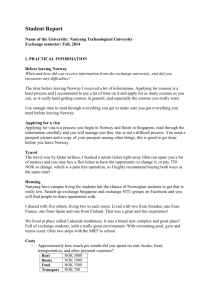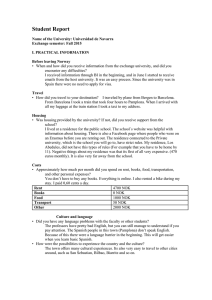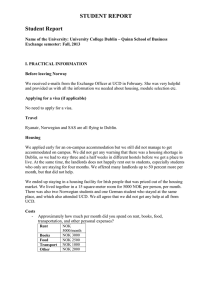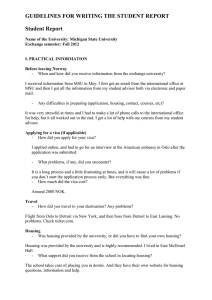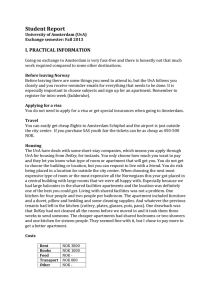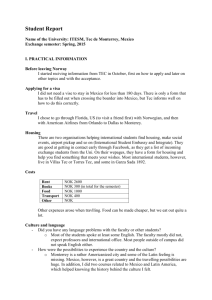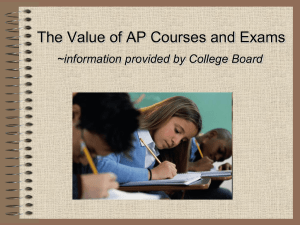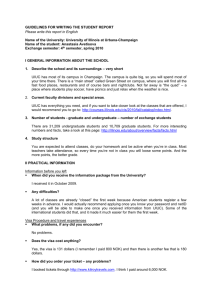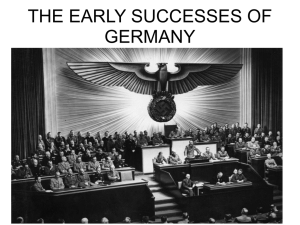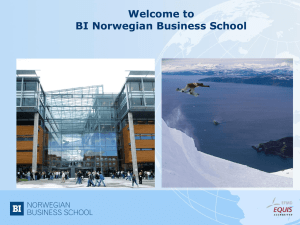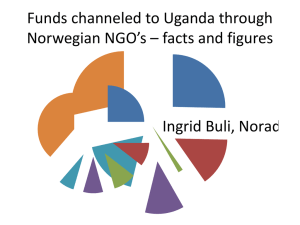Kozminiski - Fall 2012 - BI Norwegian Business School
advertisement
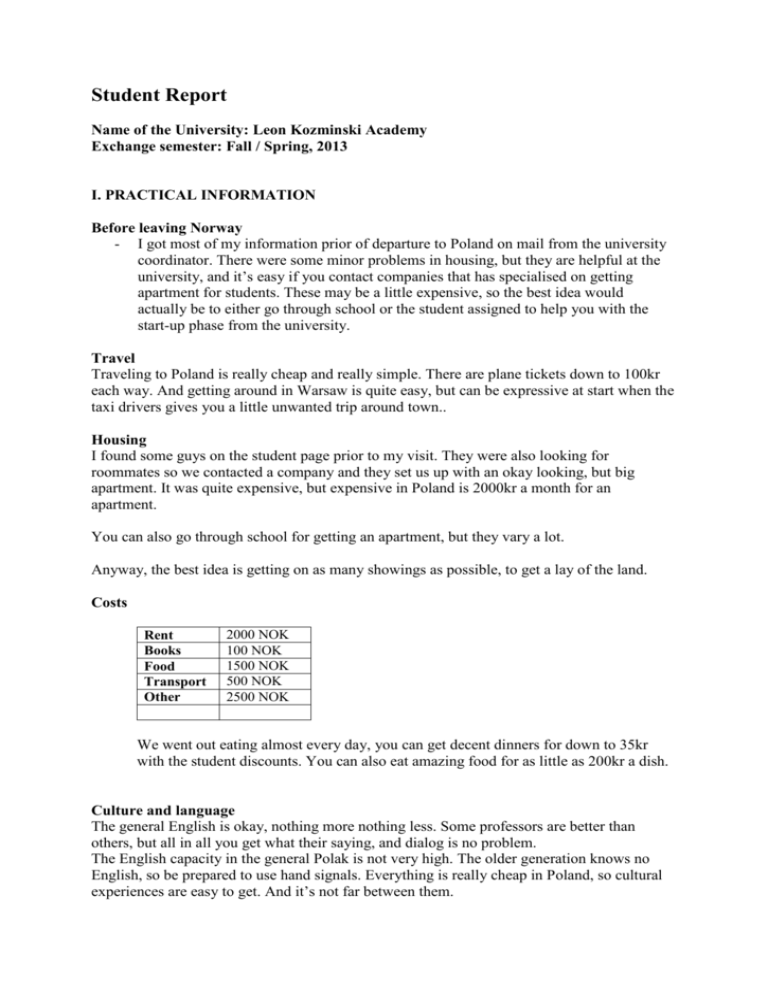
Student Report Name of the University: Leon Kozminski Academy Exchange semester: Fall / Spring, 2013 I. PRACTICAL INFORMATION Before leaving Norway - I got most of my information prior of departure to Poland on mail from the university coordinator. There were some minor problems in housing, but they are helpful at the university, and it’s easy if you contact companies that has specialised on getting apartment for students. These may be a little expensive, so the best idea would actually be to either go through school or the student assigned to help you with the start-up phase from the university. Travel Traveling to Poland is really cheap and really simple. There are plane tickets down to 100kr each way. And getting around in Warsaw is quite easy, but can be expressive at start when the taxi drivers gives you a little unwanted trip around town.. Housing I found some guys on the student page prior to my visit. They were also looking for roommates so we contacted a company and they set us up with an okay looking, but big apartment. It was quite expensive, but expensive in Poland is 2000kr a month for an apartment. You can also go through school for getting an apartment, but they vary a lot. Anyway, the best idea is getting on as many showings as possible, to get a lay of the land. Costs Rent Books Food Transport Other 2000 NOK 100 NOK 1500 NOK 500 NOK 2500 NOK We went out eating almost every day, you can get decent dinners for down to 35kr with the student discounts. You can also eat amazing food for as little as 200kr a dish. Culture and language The general English is okay, nothing more nothing less. Some professors are better than others, but all in all you get what their saying, and dialog is no problem. The English capacity in the general Polak is not very high. The older generation knows no English, so be prepared to use hand signals. Everything is really cheap in Poland, so cultural experiences are easy to get. And it’s not far between them. Cultural and social effects from the exchange experience The exchange probably will not affect my cultural side that much, but my social point of view changed a bit. Easy, and cheap point is for example why the polish people go to Norway to work, and send the money home. The scholarship we get, is as much as a decent lawyer in Poland. II. ABOUT THE SCHOOL Please describe: The school is not at the same level as Norwegian standards, but its 100% okay. It has hot meals all around divided between 3 cantinas. It takes approximately 15-20 min to centrum with a tram. (200kr for 3 months) There is quite a lot of exchange students, so the social environment you can’t complain about. I would guess somewhere around 100 exchange students. The program is formed like we are used to from our first 10 years of school, small classes where you for example can get point for being active in class. Also homework, tests and groupwork. *The school has now been ranked the 19th best school in the Global Masters in Finance ranking done by the “Financial Times”, so its actually well higher ranked than any Norwegian school* Course registration The registration opened before coming there, and it’s only a given amount of places in each course, so you either have to be quite quick (3-4 days), or maybe have to accept some courses you didn’t really want. It was a period of adding dropping courses for almost a month. Academic calendar Arrival date: First day of the semester: Last day of classes: Examination period: Any special events/holidays: Other: 15. September Late September December /January December/January Early exams are in December, just speak to the teachers, it’s quite easy to fix. Arrival When we arrived the school, everyone was well-prepared and we got started quite fast, with the week of getting to know each other. The school’s students were as we have in our “fadderuke”. And the introduction week works quite as it does in Norway, you will have fun, and it’s almost for free…. The International Office There is an international office, and it works really great, any problems or questions you had you can go and talk to them. They were very helpful with all relevant information in English if needed. Social activities It was really easy to socialize, even if you landed in groups of French or Spanish, with some Germans and other people. It was easier to get along with the exchange students and they were the people you spend time with. There were a lot of parties for the Erasmus-students of Warsaw, so you could meet new people all the time. III. ACADEMICS In the classroom The teaching style is kind of similar to what we have in high school in Norway, with homework, tests and small classes. Everything was in English and the level of study is totally different from how it’s done at BI. We had a lot of group works in the subjects I took. And some individual, but mostly it was learning by doing, not just listening to the teachers. And it’s hard to compare it to BI, but I recon it’s less work, mainly because you spread it out, so it doesn’t feel that much. And communication between students and professors was easy and again like Norwegian high school. Course materials Mainly we used printed pages or PowerPoint presentations in class. Everything we got was written in English and the level of difficulty varied a lot, from really deep financial markets and mathematics, to simpler stuff that we had a lot of in Norway. Exams All of the exams were based on what we had in class. Mainly things we got handed out but also some we had to read on our own. We had a couple of subject that didn’t have exam, but the grade was given from participation in class. We also had quite a lot of home assignment, group work and general class work that was determining the grade you got. Some classes were mandatory, while others were like Norway, where you could choose. In communication and negotiation it was small group work then class discussion. Library and technology Every student has easy access to the library and its resources. It`s a lot of reading rooms there and computer labs for those who need it. (Both in the library and separate). The general information was given both online and in class. Description of courses Course code & name Master/ Bachelor Exam form ECTS Approved as Comments Communication and Negotiation Skills Master Class participation 3 Interesting Computer sience Financial Mathematics Bachelor Bachelor Exam 2 hours Exam+ tests 4 5 Human resources Management Insurances Master Exam 4 Ok Good, if you’re into maths. Okay Bachelor 4 Ok International Business Strategy Sociology Bachelor Presentations+ small exam Exam multiple choice Exam 5 Good 2 International Financial Markets Master Exam, Multiple choice 5 Lots of work for no ECTS Very interesting Bachelor
